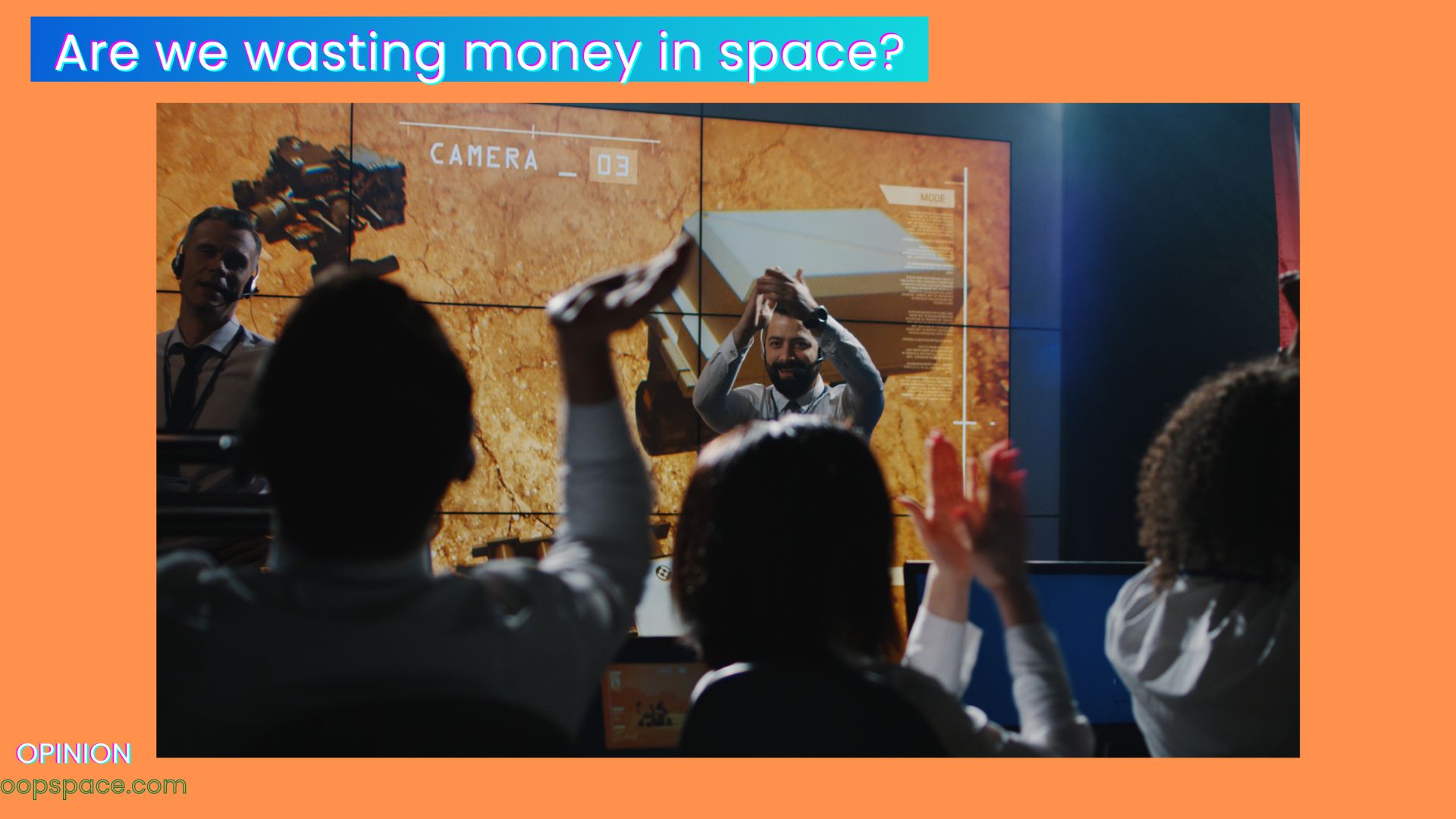Are we wasting money in space?

Before moving forward to discuss whether we are investing or just wasting money in space, let’s look at these recent data on expenses in the name of the space race.
Market research firm Euroconsult reported that $92 billion was spent globally in 2021 on the “space sector” by governments. The amount is an 8 percent increase in spending in comparison to 2020.
In an edition of the report of “Government Space Programs” earlier this year, overall spending on spaceflight activities has increased by nearly 50 percent since 2015, while total spending is expected to reach about $110 billion annually by 2030.
This shows that space is becoming more important, therefore more and more expensive things to focus on. Why is it becoming more important, as well as expensive, and how much of the money is being used correctly?
Investment in space: Or is it just wasting money?
While it sounds cool to spend in space, it seems to be more of spending rather than an investment.
So, the question that arises is are we wasting billions of dollars in space? As more and more private companies are getting into this space sector and governments are highly investing in it to expand their potential.
In return, does it give us new things, new technologies to use on Earth which can improve our society? Couldn’t that money have been spent on some better projects on Earth?
According to a report in 2014, for every dollar invested by the government, the American economy and other countries’ economies have seen $7 to $14 in new revenue, all from spinoffs and licensing arrangements. That amounts to $17.6 billion current NASA dollars spent on an economic boost worth as much as $246.4 billion annually.
Another report on the first agency-wide economic impact released in 2020, using data from the 2019 fiscal year, estimated that NASA efforts during that period generated more than $64.3 billion in total economic output that supported more than 312,000 jobs nationwide.
But when we talk about the overall development of humanity, is spending trillions of dollars in space around the moon or even Mars making any sense?
Looking at it from a broader point of view
Space is a mere fantasy. If you look at the larger perspective, there is nothing much to achieve for humanity by investing in space – here are the main reasons why:
1. What is the end goal after all?
There must be an end goal for investing trillions of dollars in space. If there is an end goal, then what is it? They might say they are planning to set up a colony on Mars and build a luxurious space hotel on the Moon.
But this is just not enough to justify trillions of dollars of investments. There must be something more than that! (if not possible, then why do we spend billions of dollars on something which doesn’t have the impact we’ve expected?)
No, creating new lifeforms on Mars just barely justifies it. The point still remains, by spending trillions of dollars on it, what are we gaining? What are we doing to humanity with this colossal amount of money?
Or how about setting up a floating city in space? This is one exception where I can see an impact after spending billions of dollars. But even then, the point is that the whole concept itself doesn’t make any sense to spend trillions of dollars on.
The thing is that there should be some kind of end goal for space spending. Otherwise, money should not be spent at all. The same goes for many other things. If there’s nothing at all to gain from it, why do we waste time and resources on it?
2. Investing in space does not bring a great return for the money invested
There are many projects which can bring a great return for the money invested – which include Artificial Intelligence research.
Contrary to space, which doesn’t even have an end goal for it, there are many projects that can bring a great return for the money invested and at the same time benefit humanity.
Artificial Intelligence is one such example. In comparison to a space project, it’s much more beneficial for humanity and does make sense for the money invested.
Other than that, we could invest billions of dollars in safeguarding the patents. Due to the lack of security of information at the current date, ideas are getting limited to the person themselves.
We are getting better versions of the same smartphones every year – but there has not been a revolutionary change in the concept itself. This could be solved by investing in protecting the ideas we develop and patenting them so that others can’t copy them.
3) It doesn’t seem we can reach anywhere far anytime soon
The farthest we can imagine right now and for the next 90 years is Mars Colonization. This is a childish idea. It’s a mere fantasy. Here are some pros of mars colonization, as they state:
a. May help to mitigate the overpopulation problem on Earth;
b. May help with the search for other life forms;
c. Backup plan for an asteroid impact;
d. So that vacation on Earth would be fun.
Mitigating the overpopulation problem on Earth is something like postponing the problem for a couple of hundred years. It is not a good long-term plan. Cleaning the Earth and developing sustainable ways to live here on Earth is much better than moving to another planet that will also have similar problems to Earth!
Or how about we search for life on other planets themselves? Yes, it’s interesting. But what about searching on this planet itself? There are many things to discover here on Earth that we are not even aware of. Or why only Mars? We don’t need to search for new life forms throughout the Universe – they themselves will one day find us, perhaps to overpower us. Then, why not invest in building an effective defense system against a possible alien invasion?
Or, why not invest in creating a backup plan for an asteroid impact? We all know that eagle-eyed asteroids are lurking there. And to invest in such projects is like carrying a parachute with you while you are flying in an airplane.
The fourth one makes sense at least. The vacations on Earth are currently too boring and have nothing much to offer. Traveling from Earth to Mars every summer would be great.
4) It’s just unreachable: Accept it
Mars Colonization is absolutely possible. But it stops right there. We can’t go anywhere further than that. It’s just unreachable.
Leave alone the vast cosmos, we can’t think about going to Jupiter. We can never make human-landing on the hell of Venus. The rest of the cosmos is, we very well know, alien to us.
As I said before, instead of spending lifetimes settling in Space or on other celestial bodies, it’s worth trying to achieve what we can.
James Webb telescope is just a tiny improvement – an enthusiastic heir to the Hubble Space Telescope. It is just a better version of a smartphone, as we discussed earlier. For the sake of continuing the pace of advancement of mankind in the past century, we need to work on projects that can make the Earth better; without having to leave Earth.
So if you ask me, what is the end goal? I really don’t think there is one. And even then, the return on trillions of dollars investment in space is not enough at all to justify it.
5. It’s like a celebration of war
Humans of this 2022 still have the same war mentality of the previous century. Similar to the people of the time, who celebrated war-race and meaningless heroism, most of today’s power-holders have pleasure in celebrating the space race. Space race has taken another form of war, which has no more goal than showing oneself superior.
Moreover, we don’t need to go into space. There is enough worth achieving here on Earth without having to go out of the Earth. This show is just a pure victory race-win-great mentality – the absurd one that we are all so tired of.
And even if we had a greater sense, there was no point in wasting our resources and time on a project which has no end goal in sight and therefore makes no sense. Why? Because it’s just like a celebration of war, an unproductive drama, which we are all so tired of now, but still keep celebrating.
So, instead of wasting money in space, investing in Artificial Intelligence, safeguarding patents, developing clean ways to live on Earth, and maintaining a healthy world for humans would be a good idea.


